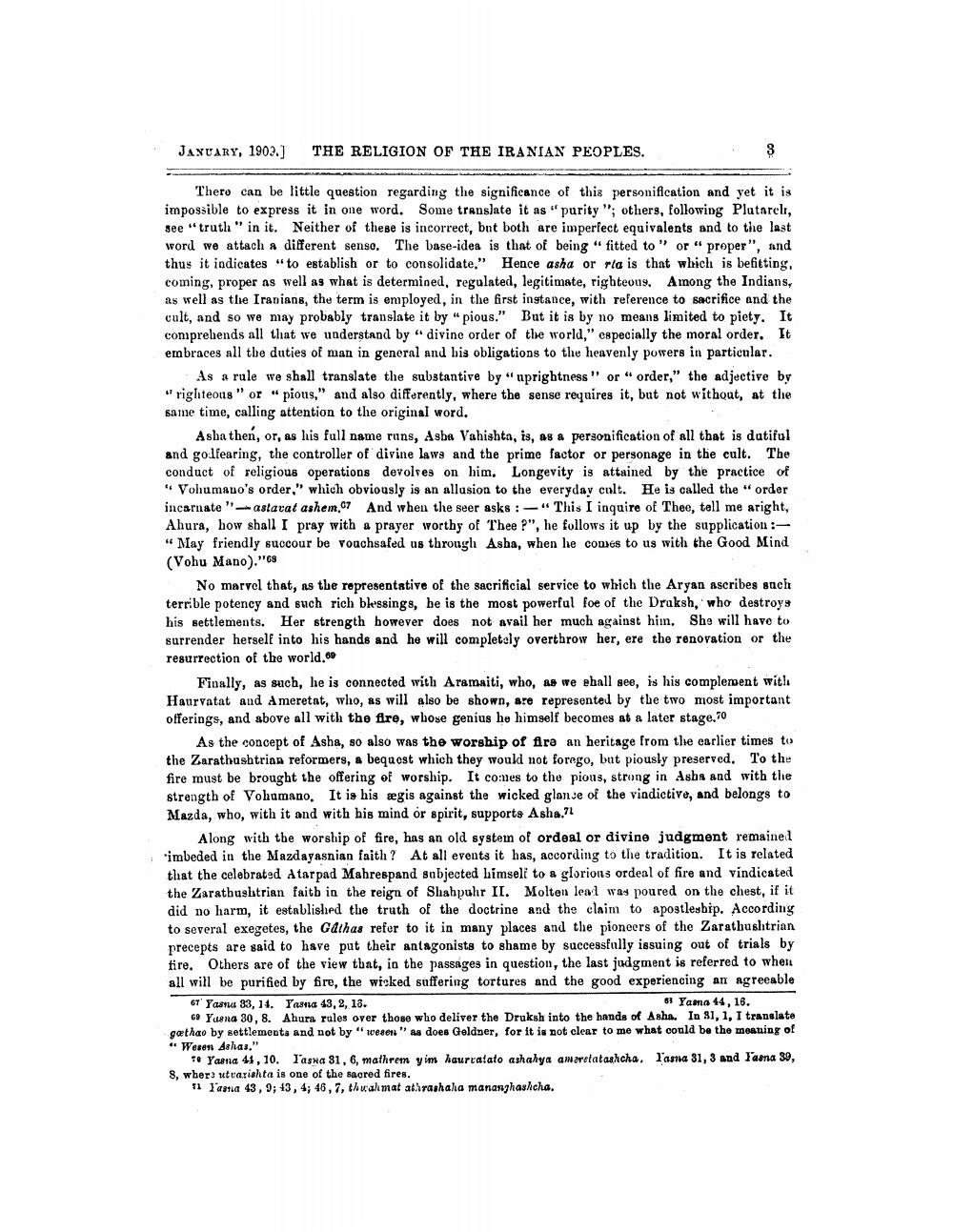________________
JANUARY, 1902.)
THE RELIGION OF THE IRANIAN PEOPLES.
3
There can be little question regarding the significance of this personification and yet it is impossible to express it in one word. Some translate it as "purity ''; others, following Plutareli, see "truth" in it. Neither of these is incorrect, but both are imperfect equivalents and to the last word we attach a different senso. The base-idea is that of being " fitted to " or "proper", and thus it indicates "to establish or to consolidate." Hence asha or ria is that which is befitting, coming, proper as well as what is determined, regulated, legitimate, righteous. Among the Indians, as well as the Iranians, the term is employed, in the first instance, with reference to sacrifice and the cult, and so we may probably translate it by " pious." But it is by no means limited to piety. It comprehends all that we understand by “divine order of the world," especially the moral order. It embraces all the duties of man in general and his obligations to the heavenly powers in particular.
As a rule we shall translate the substantive by "uprightness" or "order," the adjective by "righteous" or "pious," and also differently, where the sense requires it, but not without, at the same time, calling attention to the original word.
Asha then, or, as his full name runs, Asba Vahishta, is, as a personification of all that is datiful and golfearing, the controller of divine laws and the prime factor or personage in the cult. The conduct of religious operations devolves on bim. Longevity is attained by the practice of "Vohumauo's order," which obviously is an allusion to the everyday cult. He is called the order incarnate"-astarat ashem.C7 And when the seer asks : -"This I inquire of Thee, tell me aright, Ahura, how shall I pray with a prayer worthy of Thee?", he follows it up by the supplication :" May friendly succour be vouchsafed us through Asha, when he comes to us with the Good Mind (Vohu Mano)."68
No marvel that, as the representative of the sacrificial service to which the Aryan ascribes sach terrible potency and such rich blessings, he is the most powerful foe of the Draksh, who destroys his settlements. Her strength however does not avail her much against him. She will have to surrender herself into his hands and he will completely overthrow her, ere the renovation or the resurrection of the world.69
Finally, as such, he is connected with Aramaiti, who, as we shall see, is his complement with Haurvatat and Ameretat, who, as will also be shown, are represented by the two most important offerings, and above all with the fire, whose genius he himself becomes at a later stage.70
As the concept of Asha, so also was the worship of fra an heritage from the earlier times to the Zarathushtrian reformers, a bequest which they would not forego, but piously preserved. To the fire must be brought the offering of worship. It comes to the pious, strong in Ashs and with the strength of Vohumano. It is his ægis against the wicked glance of the vindictive, and belongs to Mazda, who, with it and with his mind or spirit, supports Asha.?!
Along with the worship of fire, has an old system of ordeal or divine judgment remainel imbeded in the Mazdayasnian faith? At all events it has, according to the tradition. It is related that the celebrated Atarpad Mahrespand subjected himseli to a glorious ordeal of fire and vindicated the Zarathushtrian faith in the reign of Shahpuhr II. Molten learl way poured on the chest, if it did no harm, it established the truth of the doctrine and the claim to apostleship. According to several exegetes, the Gathas refer to it in many places and the pioneers of the Zarathushtrian precepts are said to have put their antagonists to shame by successfully issuing out of trials by fire. Others are of the view that, in the passages in question, the last judgment is referred to when all will be purified by fire, the wicked suffering tortures and the good experiencing an agreeable GT' Yasnu 33, 14. Yasna 43, 2, 18.
63 Yama 44, 16. Go Yaona 30, 8. Ahura rules over those who deliver the Druksh into the hands of Asha. In 81, 1, 1 translate gathao by settlements and not by "wesen." as does Geldner, for it is not clear to me what could be the meaning of ** Wesen Ashas."
TO Yamna 41, 10. l'asna 81, 6, mathren y im haurralato ashahya amarelatashcha. Lasna 31, 3 and Yaona 39, 8, wher) utrarishta is one of the sacred fires.
11 Vasta 43, 9; 43, 4; 46, 7, thwalmat athrashala mananghas/cha.




